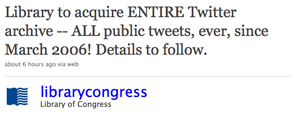According to an announcement on the Library of Congress Blog:
Every public tweet, ever, since Twitter’s inception in March 2006, will be archived digitally at the Library of Congress. That’s a LOT of tweets, by the way: Twitter processes more than 50 million tweets every day, with the total numbering in the billions.
The library even put out the word on Twitter, writes LOC blogger Matt Raymond.
 Twitter made the announcement on its blog too. Biz Stone writes that “over the years, tweets have become part of significant global events around the world — from historic elections to devastating disasters.”
Twitter made the announcement on its blog too. Biz Stone writes that “over the years, tweets have become part of significant global events around the world — from historic elections to devastating disasters.”
The tweets will be sent to the library after a six-month delay. There, they can be used for “internal library use, for non-commercial research, public display by the library and preservation.”
Stone writes:
The open exchange of information can have a positive global impact. This is something we firmly believe and it has driven many of our decisions regarding openness.
Stone also used the blog post to announce a partnership with Google called Google Replay, which will allow visitors to “revisit tweets related to historic events.”
For context, the Library of Congress operates the National Digital Information Infrastructure and Preservation Program, which tries to preserve “significant” digital content. The library began archiving congressional and presidential campaign Web sites in 2000. It now holds more than 167 terabytes of Web based information, Raymond writes.
I hope to have access to a LOC press release about the matter soon that will explain more of the historical and scholarly interest in the Twitter archive. Until then, I have to say that it seems like a good move. Twitter has, for good or ill, become the pulse of the Web. It’s worthy of study, and I think we can learn a lot about how public opinions are formed by watching people type in knee-jerk and, later, more considered reactions on Twitter.
UPDATE: The Library of Congress has released its official press statement. In it, Librarian of Congress James Billington says:
“This information provides detailed evidence about how technology based social networks form and evolve over time. The collection also documents a remarkable range of social trends. Anyone who wants to understand how an ever-broadening public is using social media to engage in an ongoing debate regarding social and cultural issues will have need of this material.”